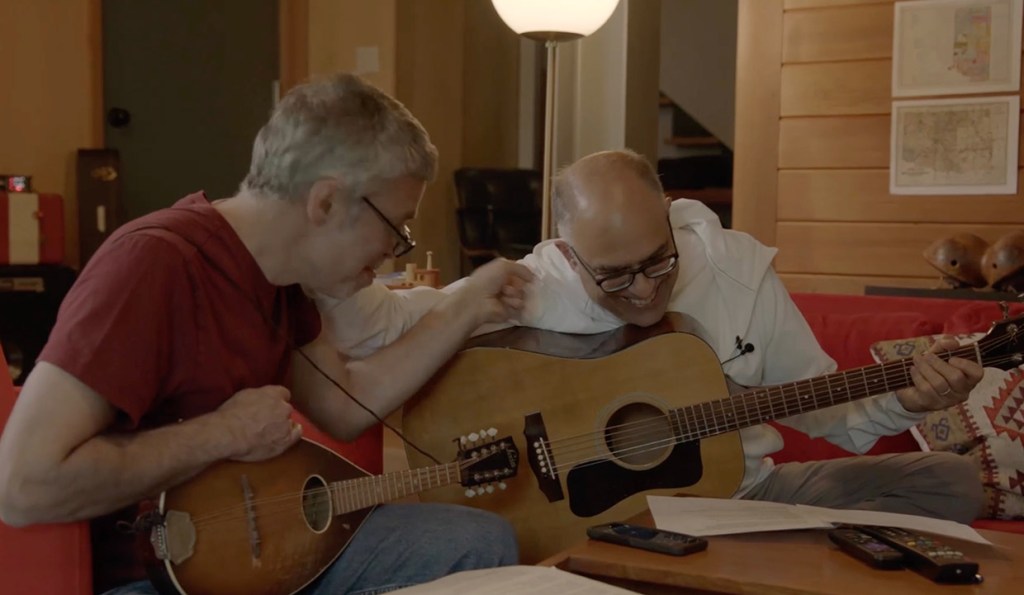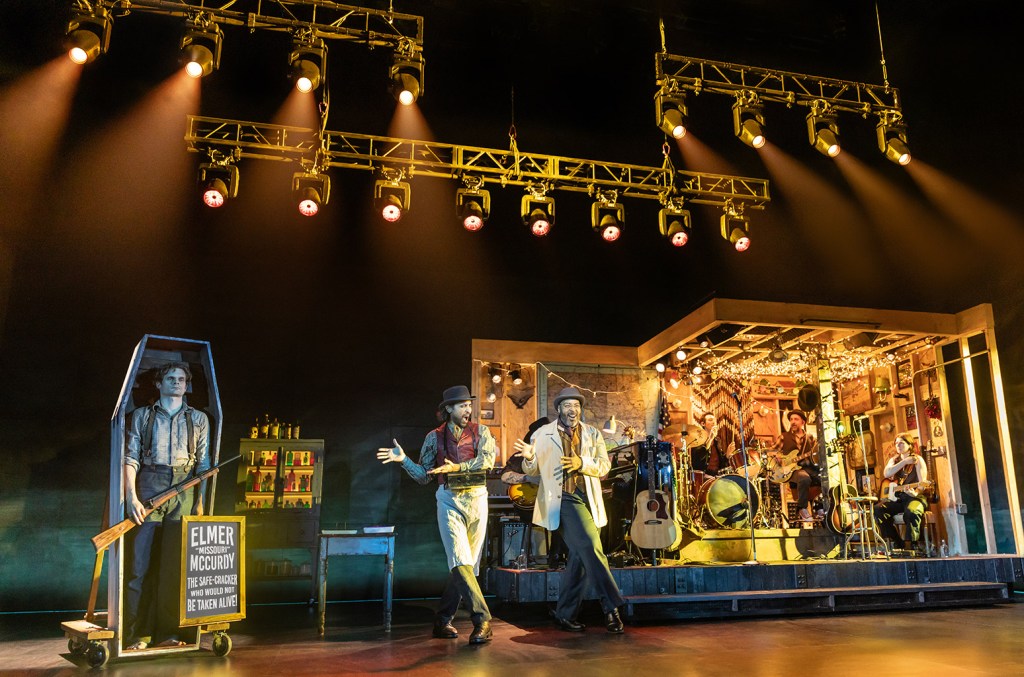How ‘Dead Outlaw’ Became An Unlikely Broadway Hit (And Multi-Tony Nominee)
One of the most acclaimed new musicals on Broadway right now has all the charm of a corpse — literally.
The unlikely subject of Dead Outlaw is the life — and death — of Elmer McCurdy, a late 19th-century ne’er-do-well who came to an early end but whose corporeal form enjoyed a bizarrely long afterlife as a well-preserved (well, for a time) traveling oddity. On paper, it might not sound like typical musical fare, but thanks to an expert creative team — led by co-composers David Yazbek and Erik Della Penna, director David Cromer and writer Itamar Moses — Elmer’s tale becomes not just strangely humorous and poignant but deeply thought-provoking.
Yazbek has a résumé stacked with great musical adaptations of films — including The Full Monty, Women on the Verge of a Nervous Breakdown, Tootsie and The Band’s Visit, the latter of which won him the Tony for best original score. But Dead Outlaw is an increasingly rare breed of show on Broadway these days, based on no pre-existing intellectual property and not driven at the box office by celebrity names above its marquee.
So far, that’s working out well: Dead Outlaw just received a best musical nomination for the 2025 Tony Awards, one of seven nods for the show also including best score for Yazbek and Della Penna’s music, which is performed by a crackerjack band onstage. Yazbek is rarely working on one show at a time — among many overlapping projects, he’s also creative consultant on the Tony-nominated Buena Vista Social Club — but he and Della Penna took the time post-opening to talk to Billboard about Dead Outlaw and why often, on Broadway, smaller is better.
How did you become aware of McCurdy’s crazy story in the first place, and how did you know it would lend itself well to musical form?
David Yazbek: The answer to the second part of that question is not until basically opening night (laughs). I heard the Elmer McCurdy story like 30-something years ago; when his body was discovered in 1976 by The Six Million Dollar Man TV crew it was a national story briefly, and I think a college friend’s mother sent him clippings about it. He told me the story and it really stuck, especially the themes of identity and death and mortality and greed and fame. For years and years, anyone who heard the actual true story was just amazed that it actually happened. And one of the people I told it to eventually was Erik, who I was in a band with and had written some songs with, and he got hooked.
Erik Della Penna: It was just such an odd story that it’s immediately compelling — anybody I tell this story to is immediately interested. I consider myself a student of American music and of history in general, so this kind of hit all my buttons for those interests
Yazbek: And those factors don’t make it an obvious thing for a musical or a play or whatever, but…
Della Penna: I feel like a musical is sort of the best way to tell the story. Theater really succeeds when it in some way represents an otherworldly environment, and there’s only scant facts in the Elmer McCurdy story. So it’s the perfect way to present them and to really show the depth of it, and not just the cold facts — to bring some humanity to it and relatability.
Yazbek: We both had the instinct that that would be the way to tell the story, and that we could write the songs to tell the story. And, you know, I guess we’re right. So far.

The ideas it brings up about achieving fame and notoriety at any cost — about this very American obsession with being remembered for something, anything — feels especially timely…
Yazbek: I have his memory of when I was maybe 15, I wrote a short story for a class, and it was kind of about that ephemeral idea that for some reason being remembered will afford you some degree of immortality. It’s just another f–king illusory comfort, but it really does drive people, sometimes for their entire lives — this idea of, “Oh sh-t, I’m gonna die. But wait a minute, I’ll be remembered! I’ll have a legacy!” Even the word legacy is dangerous. It’s why some people amass much more wealth than they should and put their name on buildings.
Della Penna: It doesn’t even work with buildings. Like, [New York’s] Alice Tully Hall is now David Geffen Hall, so what happened to Alice Tully? Now we all forget about her?
The onstage band is central to the show. Did you have a particular sonic palette or influences you were drawing upon in writing the music?
Della Penna: I think Yazbek asked me because my musical interests were in early 20th century American music…
Yazbek: That’s pretty accurate. I don’t read reviews, but people keep throwing little bits at me, and [the New York Times review] was referencing an album of mine called Evil Monkey Man, and Erik is all over that album, and just like in this show, he’s playing lap steel, different electric and acoustics, and there’s some banjo. That’s sort of at the root of all of this: Erik and I are both capable of being very eclectic in our songwriting. We both love this genre — I don’t want to call it Americana, but like you just said, that early 20th century American music…
Della Penna: And that includes Cole Porter, Irving Berlin, Jimmy Rogers…
Yazbek: And all of that stuff is very apropos for this show. The show is 100 years of American history. And from the very beginning, we sort of said, “Let’s Lennon and McCartney this” — in other words, let’s not be counting bars and who wrote what, let’s go all in, and that was part of the fun of it.
Though you do have two standout performances in central roles — Tony nominees Andrew Durand as Elmer and Jeb Brown as the narrator and bandleader — this truly feels like an ensemble piece. The cast is a band too, in a way.
Della Penna Absolutely — the cast as a band, that’s right. We were thinking about that for a while, getting a star in there [as] the narrator. I thought that would be more guaranteed juice for this to move [to Broadway]. But I also felt bad that it was sort of a cop out for the quality of the piece and the quality of the music. So I’m glad where it landed.
Yazbek: Yeah, me too. I was talking to somebody, maybe one of our producers, about how there’s the artistic currency of a show, but then there’s also, like, the currency for marketing the show itself. And to me, the currency for marketing the show is quality with a capital Q. The star of the show is how great everyone is who’s in it, and its uniqueness and its depth. Like, can’t you market that? (laughs)

Dead Outlaw started out at New York’s Minetta Lane Theater as part of Audible’s theater series there. How did that help launch the show?
Yazbek: There are several independent theaters, regional and local, that should have just immediately said, “Oh, the Band’s Visit guys. Oh, this music, oh, this story. Yeah, sure, here’s a slot.” And for some reason, I guess because we didn’t have a star and it wasn’t [preexistent] IP, they didn’t do it. I’ve had at least two artistic directors tell me how much they regret not doing it, which is very satisfying. But it was [Audible’s] Kate Navin who said, “Oh, I think we can do this. I think we want to do this.” And as the budget grew, she just saw us through the development. That takes vision.
David, you’ve done big, splashy shows, and you’ve done smaller shows like this one. As creators, does doing a smaller-scale show allow you to do something that a big budget spectacle doesn’t as much?
Yazbek: Part of it is like independent film versus studio films. There are producers out there who don’t really understand how to bring quality, other than just bringing the big flying helicopter or whatever the money can buy. There are economic exigencies to putting up a show on Broadway and keeping it running. And from the very beginning [with Dead Outlaw], I had that in my head. When we first were thinking, “Oh, well, let’s just do this as a band show with one narrator, and that narrator’s in the band” — to me, that was like, how could you say no to that? It’s just got to be good, but it’ll also be so inexpensive that you could put it in a playhouse and it could run as long as people want to see it without us having to charge $800 a ticket. Sometimes great art is done with a limited palette, as opposed to with anything you want. How much value is there in seeing these eight performers do 60 parts, and they’re great? Like, that’s f–king theater right there.
Powered by Billboard.

